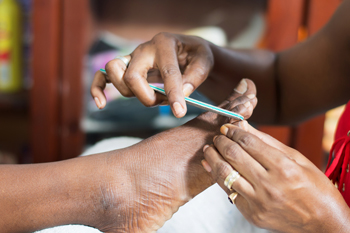

If you are someone that is prone to cracked heels, then you ought to be especially aware of the possibility of developing an infection because of this condition. Cracked heels occur when the skin covering the heel becomes severely dehydrated and fissures begin to form on the skin. As a result of these fissures, the skin might even start to bleed. Infections are an important risk to be aware of if you have cracked heels. Specifically, if an individual removes skin on the heels through a process known as debridement, an infection might occur. For example, if too much skin is removed with a razor, then the individual might be setting themselves up for a nasty infection. If you have cracked heels, it is suggested that you see a podiatrist promptly. This medical professional will be able to help you treat your condition and answer any questions you might have.
Cracked heels are unsightly and can cause further damage to your shoes and feet. If you have any concerns, contact Dr. Stephan J. LaPointe from Georgia Foot & Ankle Specialists . Our doctor can provide the care you need to keep you pain-free and on your feet.
Cracked Heels
Cracked heels appear unappealing and can make it harder for you walk around in sandals. Aside from looking unpleasant, cracked heels can also tear stockings, socks, and wear out your shoes. There are several methods to help restore a cracked heel and prevent further damage.
How Do You Get Them?
Dry skin is the number one culprit in creating cracked heels. Many athletes, walkers, joggers, and even swimmers suffer from cracked heels. Age and skin oil production play a role to getting cracked heels as well.
Promote Healing
Over the counter medicines can help, especially for those that need instant relief or who suffer from chronic dry feet.
Wear Socks – Wearing socks with medicated creams helps lock in moisture.
Moisturizers – Applying both day and night will help alleviate dryness which causes cracking.
Pumice Stones – These exfoliate and remove dead skin, which allows for smoother moisturizer application and better absorption into the skin.
Change in Diet
Eating healthy with a well-balanced diet will give the skin a fresh and radiant look. Your body responds to the kinds of food you ingest. Omega-3 fatty acids and zinc supplements can also revitalize skin tissue.
Most importantly, seek professional help if unsure how to proceed in treating cracked heels. A podiatrist will help you with any questions or information needed.
If you have any questions, please feel free to contact our office located in Rome, GA . We offer the newest diagnostic and treatment technologies for all your foot care needs.

A bunion is easy to notice. The medical term is called hallux valgus, and it is a bulge on the side or base of the big toe. It is considered to be one of the most common types of foot conditions and can be caused by several reasons. These can include genetic factors, wearing shoes that do not have enough room for the toes to move freely, or having an abnormal foot structure. Existing medical conditions such as arthritis may affect the bones in the toes, which may ultimately lead to getting a bunion. If the bunion is severe, it may cause the other toes to shift toward each other, and calluses and corns may form on top of the toes. A bunion is considered to be a deformity, and relief may come from wearing shoes that fit correctly. Additionally, some people choose to wear a protective pad over the bunion. If you have developed this condition, please contact a podiatrist who may offer surgery as a solution for permanent removal.
If you are suffering from bunions, contact Dr. Stephan J. LaPointe of Georgia Foot & Ankle Specialists . Our doctor can provide the care you need to keep you pain-free and on your feet.
What Is a Bunion?
A bunion is formed of swollen tissue or an enlargement of boney growth, usually located at the base joint of the toe that connects to the foot. The swelling occurs due to the bones in the big toe shifting inward, which impacts the other toes of the foot. This causes the area around the base of the big toe to become inflamed and painful.
Why Do Bunions Form?
Genetics – Susceptibility to bunions are often hereditary
Stress on the feet – Poorly fitted and uncomfortable footwear that places stress on feet, such as heels, can worsen existing bunions
How Are Bunions Diagnosed?
Doctors often perform two tests – blood tests and x-rays – when trying to diagnose bunions, especially in the early stages of development. Blood tests help determine if the foot pain is being caused by something else, such as arthritis, while x-rays provide a clear picture of your bone structure to your doctor.
How Are Bunions Treated?
If you have any questions, please feel free to contact our office located in Rome, GA . We offer the newest diagnostic and treatment technologies for all your foot care needs.

Toenail fungus, also termed onychomycosis, is a pervasive infection that causes discoloration and in some cases crumbling of the toenails. It is caused by a variety of fungi that thrive in dark, moist conditions, like the inside of socks and shoes. The fungi feed on keratin, which is the substance that makes up the hardened surface of your toenails. This type of toenail infection is not likely to heal on its own. Therefore, it is imperative to consult with a podiatrist who will be able to determine a course of treatment. The foot doctor may take a sample of the toenail and have it analyzed. Treatment may include removal of part of the toenail along with an antifungal cream, solution or medicated nail polish. In more advanced cases, the podiatrist may prescribe an oral antifungal medication. And in the most severe cases, removal of the entire nail may be required. Changes to footwear and to foot care practices can help to keep the infection from recurring. For help with toenail fungal infections, please contact a podiatrist.
For more information about treatment, contact Dr. Stephan J. LaPointe of Georgia Foot & Ankle Specialists . Our doctor can provide the care you need to keep you pain-free and on your feet.
Toenail Fungus Treatment
Toenail fungus is a condition that affects many people and can be especially hard to get rid of. Fortunately, there are several methods to go about treating and avoiding it.
Antifungals & Deterrence
Oral antifungal medicine has been shown to be effective in many cases. It is important to consult with a podiatrist to determine the proper regiment for you, or potentially explore other options.
Applying foot powder on the feet and shoes helps keep the feet free of moisture and sweat.
Sandals or open toed shoes – Wearing these will allow air movement and help keep feet dry. They also expose your feet to light, which fungus cannot tolerate. Socks with moisture wicking material also help as well.
If you have any questions please feel free to contact our office located in Rome, GA . We offer the newest diagnostic tools and technology to treat your foot and ankle needs.

Feet that feel good may positively affect the overall body. Simple methods can be implemented for everyday foot care, and this often begins with washing and drying the feet. Many people apply a good moisturizer which may be beneficial in keeping the skin smooth, and possibly preventing cracked heels from developing. The feet can be protected by wearing shoes that fit correctly, and this may be helpful in preventing corns and calluses. Ingrown toenails may be avoided when the toenails are trimmed properly, and wearing appropriate shoes while in public swimming areas may prevent uncomfortable fungal infections. Circulation in the feet may be improved when exercises and stretches are frequently performed, and many people enjoy getting foot massages. If you would like additional information about successful everyday foot care tips, please schedule an appointment with a podiatrist.
Everyday foot care is very important to prevent infection and other foot ailments. If you need your feet checked, contact Dr. Stephan J. LaPointe from Georgia Foot & Ankle Specialists . Our doctor can provide the care you need to keep you pain-free and on your feet.
Everyday Foot Care
Often, people take care of their bodies, face and hair more so than they do for their feet. But the feet are a very important aspect of our bodies, and one that we should pay more attention to. Without our feet, we would not be able to perform most daily tasks.
It is best to check your feet regularly to make sure there are no new bruises or cuts that you may not have noticed before. For dry feet, moisturizer can easily be a remedy and can be applied as often as necessary to the affected areas. Wearing shoes that fit well can also help you maintain good foot health, as well as making it easier to walk and do daily activities without the stress or pain of ill-fitting shoes, high heels, or even flip flops. Wearing clean socks with closed shoes is important to ensure that sweat and bacteria do not accumulate within the shoe. Clean socks help to prevent Athlete’s foot, fungi problems, bad odors, and can absorb sweat.
If you have any questions please feel free to contact our office located in Rome, GA . We offer the newest diagnostic and treatment technologies for all your foot and ankle needs.